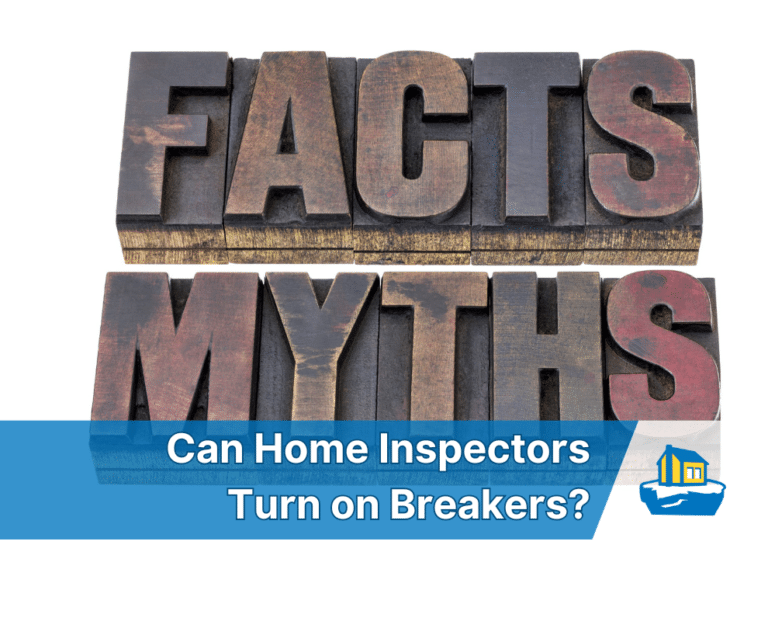4.8 1700+ Google Reviews

Can home inspectors turn on breakers? The simple answer is yes. There is nothing prohibiting home inspectors from turning on breakers, or turning on water shut off valves. Good home inspectors can, and should, be turning on most breakers and water valves.
Unfortunately, many myths exist in the home inspection industry. We wrote about several of the more common myths here.
One of those myths is that something prohibits us from turning on breakers, or operating water valves. In fact, legend has it that turning on breakers can actually burn a house down. Of course many inspectors purport to know someone, who knows someone, who knew someone that it happened to. In reality, I have yet to come across first hand knowledge of such an incident.
Knowledgeable home inspectors can appreciate the irony that one function of a circuit breaker is to prevent fires. A circuit breaker shuts off power to a circuit during faults. As a result the wires are prevented from being overloaded, over heated, and starting a fire.
If turning on a breaker does start a fire, that means the breaker is defective, and that is incredibly important information for a homebuyer – which is the entire purpose of the home inspection.
Like most myths, this myth probably started around an inspection fire and evolved overtime to what it is today.
Seriously though, most inspectors defend their position by misquoting, and misinterpreting the Standards of Practice for home inspectors.
Most reputable home inspectors are members of the International Association of Certified Home Inspectors (InterNACHI). There are other smaller and insignificant home inspector associations, but they generally have the same SOP. Even states that “write their own SOP” simply copy and past the InterNACHI SOP.
“The home inspector is not required to operate:
any shut-off valves or manual stop valves.
any electrical disconnect or over-current protection devices. “
In Virginia there is no mention of what home inspectors are to do if they approach circuit breakers in the Off Position. It does say :
“Systems in the home that are turned off, winterized, or otherwise secured so that they do not respond to normal activation using standard operating controls need not be put into operating condition. The home inspector shall state, in writing, the reason these systems or components were not inspected.”
Turning on and off a breaker is normal activation using standard operating controls. Obviously, that does not apply here.
The SOP does not require us to turn on breakers. Notably, that this is different from NOT ALLOWED.
So far we have established that home inspectors CAN turn on breakers. There is nothing prohibiting them from doing so. The idea that they’re not allowed IS A MYTH.
That leaves us with should home inspectors turn on breakers?
For the most part, yes – home inspectors should turn on breakers.
In the Marine Corps we learned something called operational risk management. There are four main principles to operational risk management.
To be clear, nothing requires home inspectors to operate breakers. Of course there is some risk involved and risk is perception based – it is different for everyone. Home inspectors who know little about the electrical system, will perceive operating breakers to be of high risk. Conversely, home inspectors who are proficient in understanding the electrical system will perceive it to be low risk.
The risk is managed by evaluating the circuits you want to operate. For example, many times homeowners turn off the dryer breaker when the property is vacant. If I inspect the dryer plug and it is in good condition, turning on the breaker has minimal risk.
If the dryer plug is broken, damaged, or missing, then turning on the breaker is a higher risk.
The benefit is that the client will know if there is a problem with the circuit.
Training inspectors on how circuit breakers work lowers their perception risk, Together with allowing the inspectors onsite to asses for additional risk manages the risk. As as a result, this allows for the best service to the client, and the least risk to inspectors, home buyers, Realtors and property.
There is nothing prohibiting home inspectors from turning on breakers. It is myth that is prohibited by the SOP. Turning on breakers is extremely low risk, and performing some operational risk management limits nearly all the risk.
When hiring a home inspector ask them if they will turn on breakers that are in the off position. If they give you a blanket “No” answer, then move on.